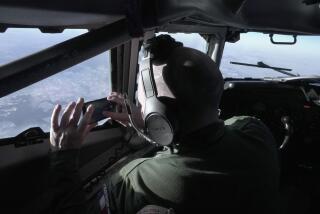Libya Plane Shot Down by French : Action Over Chad Stirs Paris Concern Over Involvement
- Share via
PARIS — French troops shot down a Libyan bomber over the capital of Chad on Monday, prompting more uneasiness in Paris over France’s growing involvement against its will in an escalation of the war in Central Africa.
The bomber, a Soviet Tupolev 22, was blasted by an American-made Hawk missile as it joined two other Libyan bombers on a punitive raid on Chad in retaliation for a Chadian invasion and seizure of a military base in Libya two days earlier.
The violent exchange reflected the failure of France to control the military ambitions of President Hissen Habre of Chad. It was sure, in fact, to increase French irritation with the United States. French newspapers reported that French officials believe that American officials, hoping for the humiliation of Col. Moammar Kadafi of Libya, have been encouraging the escapades of Habre.
Paris Defends Action
According to the French Ministry of Defense, French forces fired at the bomber before it could release its bombs over N’Djamena, the capital of Chad. This action, the ministry said, “conforms to the nature of the defensive employment” of French troops in Chad.
When the first bomber crashed, a second Tupolev 22 turned back, failing to release its bombs.
But, the Chadian Embassy in Paris said, a third Tupolev 22 dropped five bombs over the crossroads town of Abeche, 440 miles northeast of N’Djamena. One bomb hit Abeche’s newly extended military airstrip, killing two civilians and damaging the airstrip extensively.
Although the Libyans caused no damage in N’Djamena, they were bellicose in their statements. Libyan radio warned all civilian aircraft against “approaching or entering Chadian airspace as they will be exposed to danger.” The radio urged all foreign diplomats and civilians to leave N’Djamena at once for their own safety.
First Raid Since 1986
The raid over N’Djamena was the first by the Libyans since February, 1986, when their bombing of the capital’s airport prompted the French government to send air defense forces there.
The latest raid was in retaliation for the Chadian seizure last weekend of the Libyan military base of Matan as Sarra, 60 miles deep into undisputedly Libyan territory. Perhaps 2,500 Libyan soldiers are normally assigned to the base with 30 fighter-bombers and helicopters and numerous tanks. It was not known, however, how many troops and equipment were there when the Chadians attacked.
The Chadian government tried to convince France that the raid deep into Libya was “a simple defensive operation” to prevent Libyan incursions in Chad and that the Chadian troops will return to Chad soon, now that the Libyan base had been “totally destroyed.”
This did not reassure the French, who wanted to make it clear that they had nothing to do with the raid. Foreign Minister Jean-Bernard Raimond said, in a statement, that France “is not behind the Chadian army’s intervention in Libya.” Minister of Defense Andre Giraud said France “had not even been informed.”
Putting Oil on the Fire
Libya refused to accept the French version. Pointing out that the French supply the Chadians with arms, logistical support and intelligence, Hamed Elhouderi, the Libyan ambassador to France, said that “those who put oil on the fire risk being burned.”
French officials had urged President Habre earlier this summer to be content with having surprised the world by driving all of Kadafi’s forces out of undisputedly Chadian territory in a series of lightning attacks. The Libyans still controlled the Aozou Strip, but this is disputed territory claimed by both Libya and Chad, and President Francois Mitterrand and Premier Jacques Chirac, fearing escalation of the war, tried to persuade Habre to let U.N. arbitration settle the dispute.
But Habre refused to heed the pleas and sent his forces in early August into the strip, where they routed Libyan troops from the palm tree oasis town also known as Aozou. Several hundred Libyans were reportedly slaughtered, and, as the French feared, Kadafi could not accept the humiliation.
Feverish Celebrations
Three weeks later, just before the 18th anniversary of his revolution, Kadafi rushed troops back into Aozou, and they regained the town, reportedly avenging their dead compatriots from the earlier battle by killing just as many Chadians. This victory turned the anniversary celebrations feverish and powered new waves of adulation for Kadafi.
The French defense contingent, known as Operation Sparrowhawk and comprising 1,500 men, was originally sent to Chad with the mission of defending only the southern half of the country below the 16th Parallel.
Chad, a former French colony, had been in one kind of civil war or another for two decades, and the French, who have found themselves dangerously involved in the past, obviously did not want a confrontation with the Libyan troops who were supporting rebel units in the northern half.
But the surprising victories of Habre in the north in the last year, achieved with American and French military supplies and French logistical support, forced the French to change their role, moving somewhat north of the 16th Parallel. The French have insisted that their mission is still defensive.
More to Read
Sign up for Essential California
The most important California stories and recommendations in your inbox every morning.
You may occasionally receive promotional content from the Los Angeles Times.













